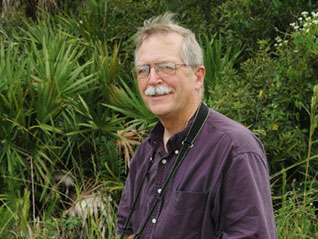
Photographed by Bette Jackson
If you are have difficulty playing the audio click here
Length of Segment: 00:01:15
Hi, I'm Dr. Jerry Jackson, out with the wild things. Because of its abundance in disturbed areas and its dependence on humans and other animals to transport its seeds from place to place, it's not surprising that the plant known as Bidens, or ‘Spanish needles’, has also been used by humans. This sunflower relative may not produce oil-rich seeds that we can munch on, but its succulent leaves and flower heads are edible and eaten as a cooked green. In the West Indies, a tea made from the leaves and flowers of Spanish needles is sometimes used as a folk medicine to reduce a fever, cure a sore throat, treat indigestion, rid a child of worms, or cure urinary infections. Its leaves have been used as a poultice on wounds, and juice squeezed from the leaves has been used as eye-wash. While there's no medical documentation that Spanish needles is truly useful for any of these purposes, it’s not a poisonous plant and some of its relatives have given us chemicals of value. As a wild plant that blooms year-round and produces substantial nectar, Spanish needles is of economic value to us in sustaining honeybee populations, and of aesthetic value in nourishing butterflies.
'With the Wild Things' is produced at the Whitaker Center in the College of Arts and Sciences at Florida Gulf Coast University. For 'The Wild Things', I'm Dr. Jerry Jackson.
< Back to Spanish Needles
For permissions please contact the owning institution. WGCU Public Media, 10501 FGCU Blvd. S., Fort Myers, FL 33965




